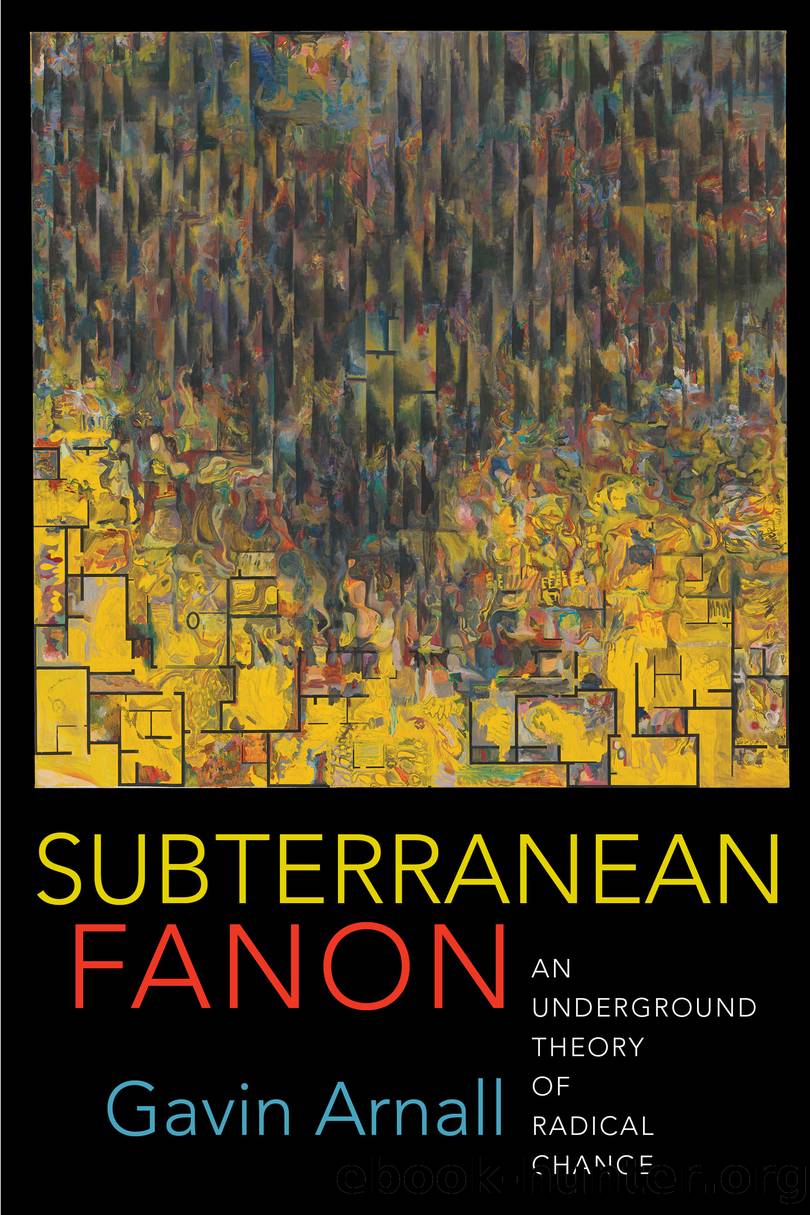Subterranean Fanon by Gavin Arnall;

Author:Gavin Arnall;
Language: eng
Format: epub
Publisher: Lightning Source Inc. (Tier 3)
THE LIMITS OF SPONTANEITY AND THE REDISCOVERY OF POLITICS
Toward the end of the second chapter of The Wretched of the Earth, it is revealed that the explosive moment of widespread spontaneous violence is not enough on its own to achieve decolonization. Instead, it sets the stage for a new moment in the dialectic of armed struggle during which the colonialist forces launch a counterattack in an effort to regain their position of authority. The colonized fight just as before, surging head-on toward the enemy with rash confidence, but they are met with heavy machinegun fire and many lives are lost. The peasant rebels hold their ground and refuse to retreat, as though âtheir own mountain peak [were] the nation.â Casualties multiply as a result and those who survive are plagued with doubt; the intense suffering âthrows the euphoria and idyll of the first period into question.â118
It is worth pausing to reflect upon the similarities between this moment in the armed struggle and the dilemma that Ãpithalos faces in Parallel Hands.119 After his explosive act of violence, he too is surrounded by death and suffering, and his steadfast conviction toward the significance of his act is shaken. In both cases, the same questions arise: Was the act that promised a complete and total change destined to fail? Does the revolutionary event merely contribute to completing another revolution of the same tragic circle that leads from order to disorder to order again? Was the euphoria of the struggle the product of an illusion? Fanon begins to answer these questions in The Wretched of the Earth when he transitions from a focus on the grandeur of spontaneity to a critical account of its various weaknesses. This is also the moment when he implicitly refers to and problematizes a number of claims put forward in âOn Violenceâ during his conflicted account of decolonization.
Fanonâs critique of spontaneity begins with a discussion of its voluntarism: âThis spectacular voluntarism ⦠[has] proved in light of experience to be a very great weakness. As long as he imagined passing, without transition, from the state of the colonized to the state of the sovereign citizen of an independent nation, as long as he believed in the mirage of the immediacy of his muscles, the colonized achieved no real progress along the road of knowledge.â120 Notice how this passage calls into question Fanonâs previous claim that decolonization constitutes a transitionless substitution of the colonized thing for the new man. When the peasant masses spontaneously revolt, they believe that this kind of change is possible and that the exertion of brute force is its guarantee. But Fanon maintains that experience reveals this belief to be a voluntarist illusion of spontaneity. The colonized may demand an immediate exchange of one kind of being for another, but history moves at a different rhythm. It should be clear, however, that Fanon is not calling for a return to gradualist reformism but rather for a dialectical overcoming of transitionless substitution. In Fanonâs words, âThis voluntarist
Download
This site does not store any files on its server. We only index and link to content provided by other sites. Please contact the content providers to delete copyright contents if any and email us, we'll remove relevant links or contents immediately.
The Power of Myth by Joseph Campbell & Bill Moyers(1068)
A Social History of the Media by Peter Burke & Peter Burke(988)
Half Moon Bay by Jonathan Kellerman & Jesse Kellerman(987)
Inseparable by Emma Donoghue(983)
The Nets of Modernism: Henry James, Virginia Woolf, James Joyce, and Sigmund Freud by Maud Ellmann(913)
The Spike by Mark Humphries;(812)
The Complete Correspondence 1928-1940 by Theodor W. Adorno & Walter Benjamin(789)
A Theory of Narrative Drawing by Simon Grennan(783)
Culture by Terry Eagleton(776)
Ideology by Eagleton Terry;(743)
World Philology by(719)
Farnsworth's Classical English Rhetoric by Ward Farnsworth(715)
Game of Thrones and Philosophy by William Irwin(712)
Bodies from the Library 3 by Tony Medawar(709)
High Albania by M. Edith Durham(705)
Adam Smith by Jonathan Conlin(695)
A Reader’s Companion to J. D. Salinger’s The Catcher in the Rye by Peter Beidler(689)
Monkey King by Wu Cheng'en(654)
Comic Genius: Portraits of Funny People by(652)
